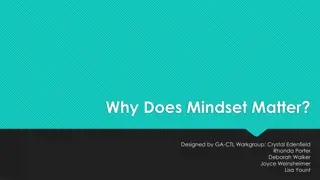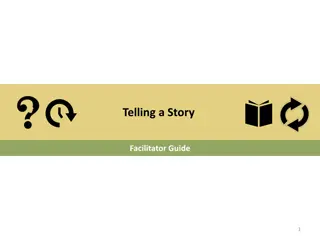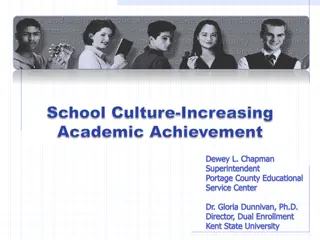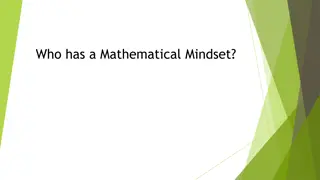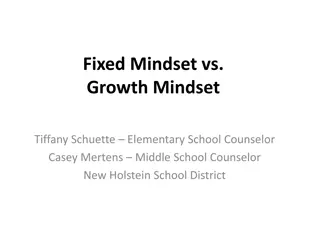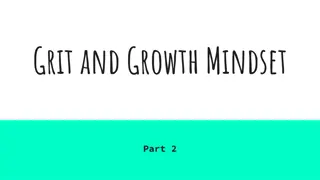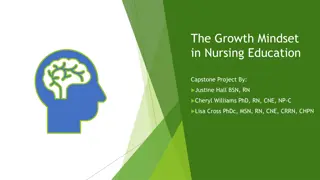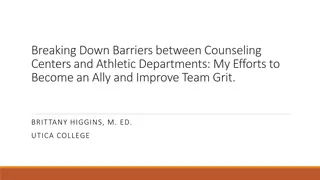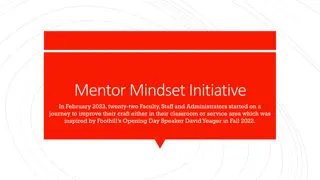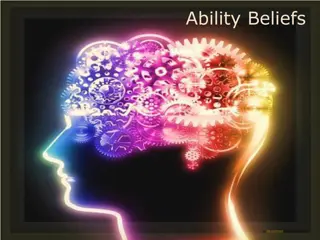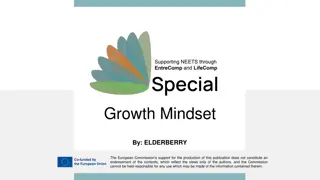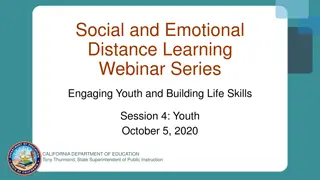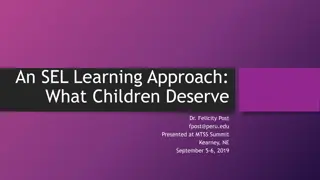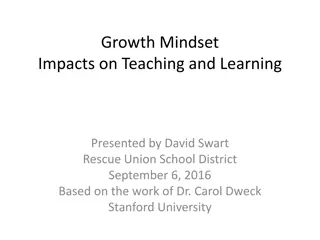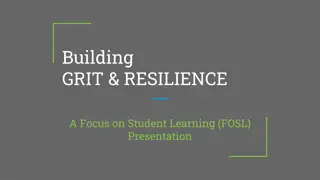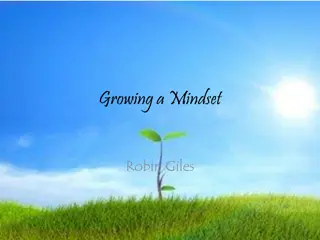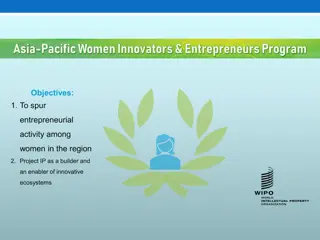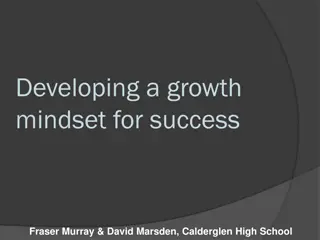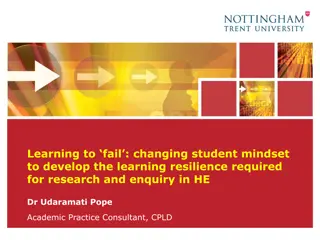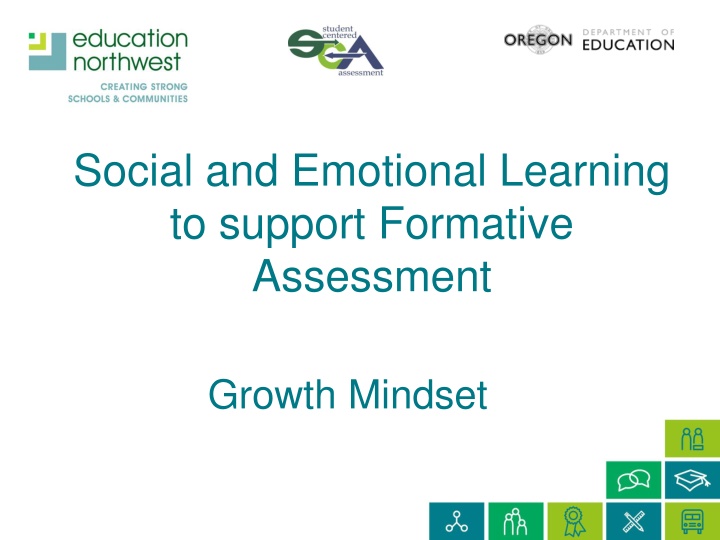
Supporting Growth Mindset for Formative Assessment through Social and Emotional Learning
Explore the intersection of growth mindset, formative assessment, and social-emotional learning. Discover the importance of fostering a growth mindset, practical strategies for implementation, and the impact on academic outcomes.
Download Presentation

Please find below an Image/Link to download the presentation.
The content on the website is provided AS IS for your information and personal use only. It may not be sold, licensed, or shared on other websites without obtaining consent from the author. If you encounter any issues during the download, it is possible that the publisher has removed the file from their server.
You are allowed to download the files provided on this website for personal or commercial use, subject to the condition that they are used lawfully. All files are the property of their respective owners.
The content on the website is provided AS IS for your information and personal use only. It may not be sold, licensed, or shared on other websites without obtaining consent from the author.
E N D
Presentation Transcript
Social and Emotional Learning to support Formative Assessment Growth Mindset
Learning objectives By the end of this session, participants will be able to: Define growth mindset Understand the importance of growth mindset for formative assessment Feel familiar with the research base in this area Use actionable strategies to promote growth mindset with students Train other adults using the materials provided
Growth mindset: What is it? Growth mindset Fixed mindset I failed because I m dumb. Maybe I need a new strategy. If I have to try hard, I m not smart. Trying harder makes you smarter.
Growth mindset: What is it? It s NOT just about a student s effort. The educational environment is important for changing mindset.
How does growth mindset relate to formative assessment? Formative assessment depends on students and teachers having growth mindsets Both have to think of intelligence as something that can increase Both have to expect that it will take time and effort for learning or mastery to happen Both have to anticipate there will be challenges and mistakes as students learn new things, but those are just part of the learning process
The importance of growth mindset Growth mindset has been linked to a number of academic and non-academic outcomes including: Grades Test scores Learning goals Motivation Persistence Engagement For more research background, see Dweck, C., Walton G., & Cohen, G.(2014). Academic tenacity: Mindset and skills that promote long-term learning. Seattle, WA: Bill and Melinda Gates Foundation
Promoting growth mindset: What can we do? Small classroom changes can help a lot There is also evidence that interventions in K 12 settings have large and enduring effects Interventions can be low cost and easy to implement, such as reading articles, doing writing exercises, or playing games
Growth mindset article studies Most people don t know that when they practice and learn new things, parts of their brain change and get larger, a lot like the muscles do. This is true even for adults. So it s not true that some people are stuck being not smart or not math people. You can improve your abilities a lot, as long as you practice and use good strategies. Excerpt from You Can Grow Your Brain by Lisa S. Blackwell and David S. Yeager Visit Mindsetworks.com for more information about articles and other activities
Growth mindset article studies Students read an article describing the brain s ability to restructure itself through effort. The article focuses on the implications for students potential to become more intelligent through study and practice. This message is reinforced through several writing exercises. Interventions were given to 1,594 students in 13 geographically diverse high schools. The interventions were most beneficial for low-performing students. Among students at risk of dropping out of high school (a third of the sample), each intervention raised students semester grade point averages (GPA) in core academic courses and increased the rate of satisfactory performance in core courses by 6.4 percentage points. Paunesku, D., Walton, G. M., Romero, C., Smith, E. N., Yeager, D. S., & Dweck, C. S. (2015).
Classroom strategy to promote growth mindset: praise vs. encouragement Focus on the process, not the outcome.
Classroom strategy to promote growth mindset: praise vs. encouragement Fixed mindset Growth mindset You are so talented You put a lot of work into that. What do you think? You did it right Your effort paid off I like how you did that I can tell you ve been practicing. You re a natural Great work Great improvement
Classroom strategies to promote growth mindset What is a growth mindset? Let them in on it! Share stories and observations about how you and other adults (including famous ones) have overcome challenges Model your own growth mindset: Show how you can grow and improve with effort, feedback, and practice Make changes in class based on student feedback
Exercise To Promote Growth Mindset: The Mistake Game
The mistake game This activity is adapted from resources found on MindsetKit.org, a site created by the Stanford Project for Education Research That Scales (perts.net) This game can be tailored to different age groups or other subjects besides math Visit Mindsetkit.org for more information and free resources for educators of all grades
The mistake game First, students work individually on math problems relevant to the lesson. Then, they share their solutions with a group. The group chooses one solution to share with the whole class. IMPORTANT! Each group makes a mistake on purpose while presenting. The class spots the mistake and asks questions about it. Visit Mindsetkit.org for more information and free resources for educators of all grades
Thank You! SEL for Formative Assessment by Davidson, S., Bates, L., McLean, C. and Lewis, K. is licensed under a Creative Commons Attribution-NonCommercial-ShareAlike 4.0 International License.

